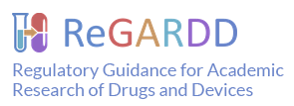The Regulatory Guidance for Academic Research of Drugs and Devices (ReGARDD) Program provides academic researchers with the regulatory tools and resources necessary to successfully navigate the pathway from discovery to clinical implementation of new drugs, biologics and medical devices.

Through our shared website, we offer current best practices for preparing IND and IDE submissions to the FDA, easy access to protocol and submission templates, and in-depth guidance concerning drug and device clinical research pathways.
By means of our Regional Regulatory Forum, we strengthen the regulatory affairs workforce at each of our affiliate institutions by providing exposure to a broad array of regulatory knowledge. The Forum provides a platform to share best practices, enables discussion of complex regulatory issues and allows us to benefit from our collective regulatory expertise.
The ReGARDD Program team consists of regulatory affairs specialists and experts from the three North Carolina CTSA hubs (UNC and partner RTI International, Duke, and Wake Forest) and CTSA hubs at MUSC, VCU, and University of Miami.
To learn more about ReGARDD and to access helpful tools and resources, see our website at regardd.org